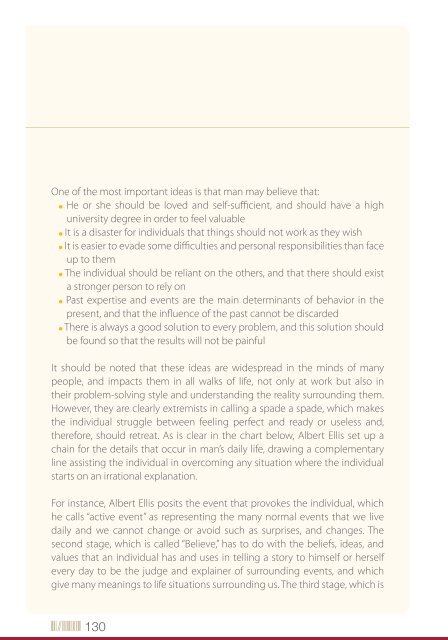General Supervisor
General Supervisor
General Supervisor
Create successful ePaper yourself
Turn your PDF publications into a flip-book with our unique Google optimized e-Paper software.
One of the most important ideas is that man may believe that:<br />
He or she should be loved and self-sufficient, and should have a high<br />
university degree in order to feel valuable<br />
It is a disaster for individuals that things should not work as they wish<br />
It is easier to evade some difficulties and personal responsibilities than face<br />
up to them<br />
The individual should be reliant on the others, and that there should exist<br />
a stronger person to rely on<br />
Past expertise and events are the main determinants of behavior in the<br />
present, and that the influence of the past cannot be discarded<br />
There is always a good solution to every problem, and this solution should<br />
be found so that the results will not be painful<br />
It should be noted that these ideas are widespread in the minds of many<br />
people, and impacts them in all walks of life, not only at work but also in<br />
their problem-solving style and understanding the reality surrounding them.<br />
However, they are clearly extremists in calling a spade a spade, which makes<br />
the individual struggle between feeling perfect and ready or useless and,<br />
therefore, should retreat. As is clear in the chart below, Albert Ellis set up a<br />
chain for the details that occur in man’s daily life, drawing a complementary<br />
line assisting the individual in overcoming any situation where the individual<br />
starts on an irrational explanation.<br />
For instance, Albert Ellis posits the event that provokes the individual, which<br />
he calls “active event” as representing the many normal events that we live<br />
daily and we cannot change or avoid such as surprises, and changes. The<br />
second stage, which is called “Believe,” has to do with the beliefs, ideas, and<br />
values that an individual has and uses in telling a story to himself or herself<br />
every day to be the judge and explainer of surrounding events, and which<br />
give many meanings to life situations surrounding us. The third stage, which is<br />
130<br />
called “Consequence,” is a reaction and outcome of thinking and believing. The<br />
problem lies in its details since beliefs at the second stage, and feelings and<br />
emotions at the third stage monitor reaction, with belief and emotion as two<br />
things doing the same job, rooting the individual’s conviction and driving him<br />
or her toward a given behavior in face of the active event and the operation<br />
becomes as if it were a closed circuit.<br />
The solution here is that the individual should not stop at the third stage,<br />
but allows for the discussion of his or her beliefs, inspects their weaknesses<br />
and drawbacks, and tries to replace them, which Albert Ellis called “Disputing<br />
intervention.” This fourth stage is the stage at which the individual tries the new<br />
idea since the fifth stage is important in emotionally supporting, digesting,<br />
and familiarizing with the new idea, which is called “effective philosophy.”<br />
The individual practices and tests the drawbacks of the new idea till the idea<br />
becomes more stable since the new emotions and feelings about it have<br />
become stable, clear, and supportive of new decisions that the individual<br />
makes in daily events.<br />
An individual that can make responsibility lie in himself or herself, his or her<br />
capacities and performance needs to be flexible and capable of grasping<br />
events more objectively and rationally. Recently, several pieces of research<br />
have shown that intellectual intelligence is important for a person’s agreement<br />
with the various life events. However, in his disputing intervention, Albert<br />
Ellis indicates that an intellectually intelligent and academically outstanding<br />
individual needs what is known as emotional intelligence. Intellectual<br />
intelligence appears in education in subjects that require cognitive capacities<br />
such as understanding, perception, attention, retrieving information, analyzing<br />
and inferring, learning, judgment, memory, and abstract thought. However,<br />
emotional intelligence appears frequently through the capacity for planning,<br />
strategic thinking, balancing alternatives, decision-making, learning from<br />
131


